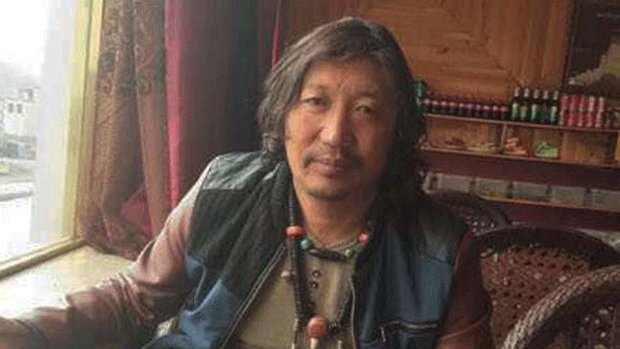Contacts:
John Jones, Free Tibet [English],
E: john@freetibet.org,
T: 0207 324 4605
Dorjee Tseten, Students for a Free Tibet [English, Tibetan],
Lobsang Yangtso, International Tibet Network [Tibetan, English, Hindi],
T: +91 88265 07768
Mandie McKeown, International Tibet Network [English],
T: +44 (0)7748 158 618
[London] The seven-year prison sentence against Tibetan nomad and environment activist A-Nya Sengdra for “gathering people to disturb public order” and “picking quarrels and provoking trouble” highlights the Chinese authorities’ unyielding assault on the rights of the Tibetan people to defend their cultural rights. A-Nya Sengdra was found guilty on 6 December 2019 by a court in Golog Prefecture, Amdo eastern Tibet [1]. He and his lawyer plan to appeal this sentence.
Tibetans and Tibet Groups have expressed their dismay at the news of the sentence, which comes after 14 months of detention. Arrested on 4 September 2018 by security forces in Gade County, A-Nya was beaten and held without access to a lawyer for the first 48 days of his detention. His detention period was extended several times since 2018 and a request by his lawyer for bail was rejected. His wife and other family members were not permitted to see A-Nya Sengdra in detention.
“A-Nya has become the latest victim of China’s systematic plan to silence and imprison Tibetans.” said Dorjee Tseten from Students for a Free Tibet. “The trumped up charges against him are farcical and reflect China’s lack of rule of law and respect for basic human rights. Tibetans and supporters around the world will continue to press for A-Nya’s release.”
In the weeks following A-Nya Sengdra’s arrest, nine other Tibetans from Golog County were also arrested [2]. Eight of them also stood trial today and were also sentenced to prison.
A-Nya’s brother Jimtri, who was arrested on 16 December 2018, was due to stand trial today after spending almost a year in detention. However, news has emerged that Jimtri died after being taken from his detention center to hospital in Xining, Qinghai Province. The full circumstances of Jimtri’s death are not yet known.
“A-Nya’s repulsive treatment following his arrest is indicative of how the Chinese Communist Party treats Tibetans who speak out,” said John Jones from Free Tibet. “His peaceful work to protect the environment and challenge corruption highlighted problems that the authorities should have taken seriously. But rather than listening, the CCP decided that A-Nya must be locked away in silence. Only the release of A-Nya and the other eight convicted today, and an investigation into Jimtri’s death, can begin to repair this shameful behaviour.”
The trial began yesterday (Thursday 5 December) morning but only concluded today. In a tweet after the trial, A-Nya Sengdra’s lawyer, Lin Qilei, stated that his client refused to accept the verdict and that he would appeal. The same tweet by Lin Qilei showed that A-Nya’s son was present for the trial. It is currently not know whether other family members or observers were able to attend.
A-Nya Sengdra is widely respected among his community for his campaigning against illegal mining activities, government corruption, and the illegal hunting and poaching of endangered animals. In 2014 he, and other local Tibetan nomads, founded a voluntary organisation called ‘Mang Dhon Ling’ (Public Affairs Forum) to fight against corruption and abuses of power by local Chinese officials.
“Not only were A-Nya’s activities before his arrest not a criminal offence – they were essential actions in these times of acute environment crisis,” said Lobsang Yangtso from International Tibet Network. “Activists around the world are working to protect the environment and ensure that they land that they live on will be fit for future generations. Living under China’s occupation has meant A-Nya’s environmental protection work has lead to him being classed as a criminal rather than an environment justice hero.”
A-Nya Sengdra’s arrest and conviction fits a wider pattern of harassment of Tibetan activists and environmental defenders, which has seen hundreds of arrests. Starting in February 2018, provincial and regional authorities across Tibet have overseen a crackdown against what the CCP calls “underworld forces” and “criminal gangs”. Public notifications, appealing for help from the public, have made it clear that the definition of criminal gangs includes Tibetans who organise protests to protect the environment, critics of local or national government authorities and Tibetans trying to preserve Tibet’s language and customs.
Information from official sources and information that has been smuggled out Tibet suggests that at least 400 Tibetans have been arrested as part of this crackdown, with 385 people in the Tibet Autonomous Region alone being tried and found guilty of so-called “gang-related crimes” between January and December 2018.
“The Chinese government has a dangerous habit of manipulating their own laws in order to criminalise Tibetans in Tibet,” said Padma Dolma, Tibet Justice Center. “Since 2018, Chinese authorities have been issuing regulations that can get Tibetans arrested en masse and under false charges. Nomad and community leader A-Nya Sengdra is the victim of a crackdown that has seen over 400 Tibetans convicted last year, despite no evidence being presented that they committed a crime; further evidence that being a Tibetan in the People’s Republic of China today is to be a threat to state security.”
– ends –
Notes:
- Golog County, Amdo, eastern Tibet [Chinese: Gande County, Guoluo Tibetan Autonomous Prefecture, Qinghai Province
- Their names are: Sothor, Asho, Dosang, Wanggyal, Gyaltsen, Abhi, Ugen Tsering, Wanchen and Jimtri, who was A-Nya Sengdra’s brother.

